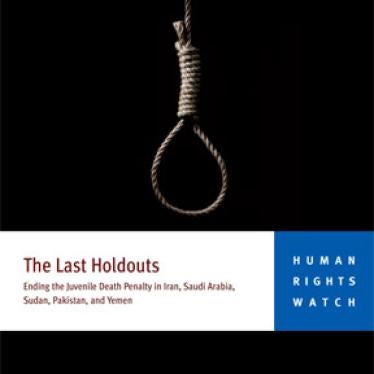(New York) - The Iranian judiciary should immediately suspend plans to execute Mohammad Reza Haddadi and permanently revoke his death sentence, Human Rights Watch said today. Haddadi, now 23, is scheduled to be executed on July 7, 2010, for a murder he allegedly committed when he was just 15 years old. International law prohibits the imposition of the death sentence on child offenders.
On July 4, Haddadi's family received a summons indicating that their son is scheduled to be executed on July 7. This is at least the third time prison authorities have notified Haddadi's family of his imminent execution. On May 27, 2009, Ayatollah Hashemi Shahroudi, who was then head of the judiciary, intervened at the last minute and halted the execution. The government rescheduled Haddadi's execution for July 16, 2009, but the judiciary spared his life again.
"Haddadi's execution order is not just unlawful - it is cruel and inhuman," said Sarah Leah Whitson, Middle East director at Human Rights Watch. "It is also needlessly cruel to his family that they have had to endure constant reminders during the past seven years that their child is at imminent risk of execution."
Under Iranian law, majority is attained at the age of puberty as stipulated by Sharia law. Under Iran's 1991 Civil Code, puberty is attainted at 15 lunar years (14 years and 5 months) for boys and 9 lunar years (8 years and 8 months) for girls, allowing judges to sentence children at these ages as adults. However, Iran is a party to the United Nations Convention on the Rights of the Child and the International Covenant on Civil and Political Rights, both of which explicitly prohibit sentencing individuals to death for crimes committed under age 18.
On January 6, 2004, a court in Shiraz found Haddadi and his co-defendants guilty of kidnapping and hiding the body of Mohammad Bagher Rahmat in an attempt to steal the victim's car. In addition, the court convicted Haddadi of Rahmat's murder. Rahmat's body was burned and buried at the side of a road. Mohammad Mostafaei, Haddadi's lawyer, said his client initially confessed to suffocating Rahmat with a belt after his co-defendants had struck Rahmat over the head with a stone and locked him in the trunk of the car. Later, on October 30, 2003, Haddadi again confessed to the killing during a court session.
After Haddadi's family received the latest summons, Human Rights Watch spoke to Haddadi's father who told Human Rights Watch that he was en route to Shiraz to visit his son before the order is carried out and indicated that he had spoken to his son once during the past few weeks. He called on the authorities to spare his son's life and retry him in light of strong evidence suggesting his innocence and said his son's co-defendants manipulated him into taking the blame for the murder by promising that they would give his family money in return.
At the time of the murder, Haddadi was the only one under age 18 who was implicated in the crime.
In his blog, Mostafaei indicated that when his client realized that he had been fooled by his co-defendants, he wrote a letter to the court informing it that he had taken no part in the murder and had only accepted blame because of his co-defendants' false promises. Despite this, Branch 24 of the Supreme Court confirmed Haddadi's death sentence on July 3, 2005. Mostafaei has also cited other evidence indicating that Haddadi was not guilty of the crime.
"The allegation that Haddadi was manipulated into taking the blame precisely because he was younger than the other co-defendants should provide compelling reason of itself to suspend his execution" Whitson said.
Iran leads all countries of the world in executing juvenile offenders. Since January 2005, only four other countries are known to have executed juvenile offenders - Saudi Arabia, Sudan, Pakistan, and Yemen. The judiciary issued Haddadi's death sentence despite a 2004 order by then-Head of the Judiciary Ayatollah Hashemi Shahrudi banning death sentences for individuals convicted of crimes committed under the age of 18.
Iran executed at least four juvenile offenders in 2009 and eight in 2008. According to human rights lawyers in Iran, more than a 100 juvenile offenders are currently on death row.
"Regardless of guilt or innocence, no one should be executed for a crime committed as a child," Whitson said. "The Iranian judiciary should show Haddadi mercy and abide by Iran's international obligations banning executions for crimes committed by children."







